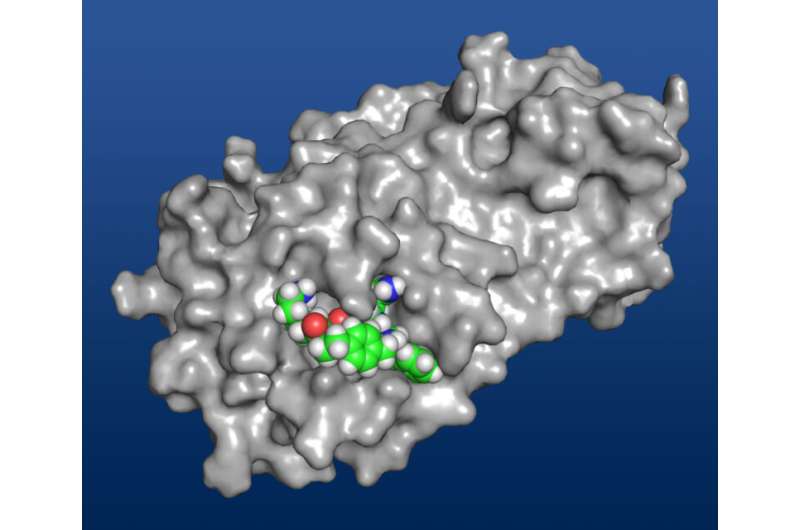Scientists get 'initial hit' in developing drug to treat COVID-19

When the coronavirus pandemic hit, almost everyone at the University of California, Irvine—and colleges across the nation—had to abandon campus. But James Nowick, professor of chemistry, was not a part of that exodus. That's because his lab, which designs and constructs chemical molecules, had the right equipment to help in the global push to find treatments for COVID-19.
Nowick's team set to work in April, and now, on the preprint server bioRxiv, they describe the development of a ring-shaped molecule called a macrocycle that's designed to gum up the machinery of the virus by blocking the action of an enzyme essential for it to reproduce.
Adam Kreutzer, a project scientist in Nowick's group, spearheaded the effort to design and produce the new molecule. "We didn't know for sure if we could synthesize the macrocycle, because sometimes macrocycles can be difficult to synthesize," Nowick said.
But Kreutzer succeeded on his first try with the macrocycle the team thought might work. "It's a novel molecule that's never been made before," he said.
The researchers then tested the macrocycle to see if it could block the action of the coronavirus enzyme. The macrocycle binds to an enzyme molecule called the main protease that's necessary for the virus to function. The protease cleaves long strings of proteins that the virus forces its host cell to make into separate components, which the virus then uses to keep replicating.
The new macrocycle, Kreutzer said, "sits there in the active site of the enzyme and makes it nonfunctional."
The research goes hand-in-hand with work in the lab of Rachel Martin, also a UCI professor of chemistry, who is determining the range of shapes that the coronavirus's main protease can take. Identifying these various structures is what allowed Nowick's lab to design a macrocycle that can lock onto the coronavirus.
This strategy for stopping the protease, Nowick noted, is the same employed in a key class of drugs for treating human immunodeficiency virus. But because the viruses are so different, the same inhibitors can't be used for both.
Nowick and his team named the macrocycle University of California, Irvine Coronavirus Inhibitor-1, or UCI-1, to indicate that it's the first molecule in what will still be a long journey to create a drug to treat or prevent COVID-19.
Now that Nowick's lab has a prototype called an "initial hit," researchers need to make additional molecules that are more effective in blocking the protease. Then they must figure out how to actually deliver the best molecule to infected cells.
This means that, while the new macrocycle is a promising first step, Nowick said, "people need to understand that it's a long way from a drug candidate."
More information: Adam G. Kreutzer et al. Structure-Based Design of a Cyclic Peptide Inhibitor of the SARS-CoV-2 Main Protease, (2020). DOI: 10.1101/2020.08.03.234872




















